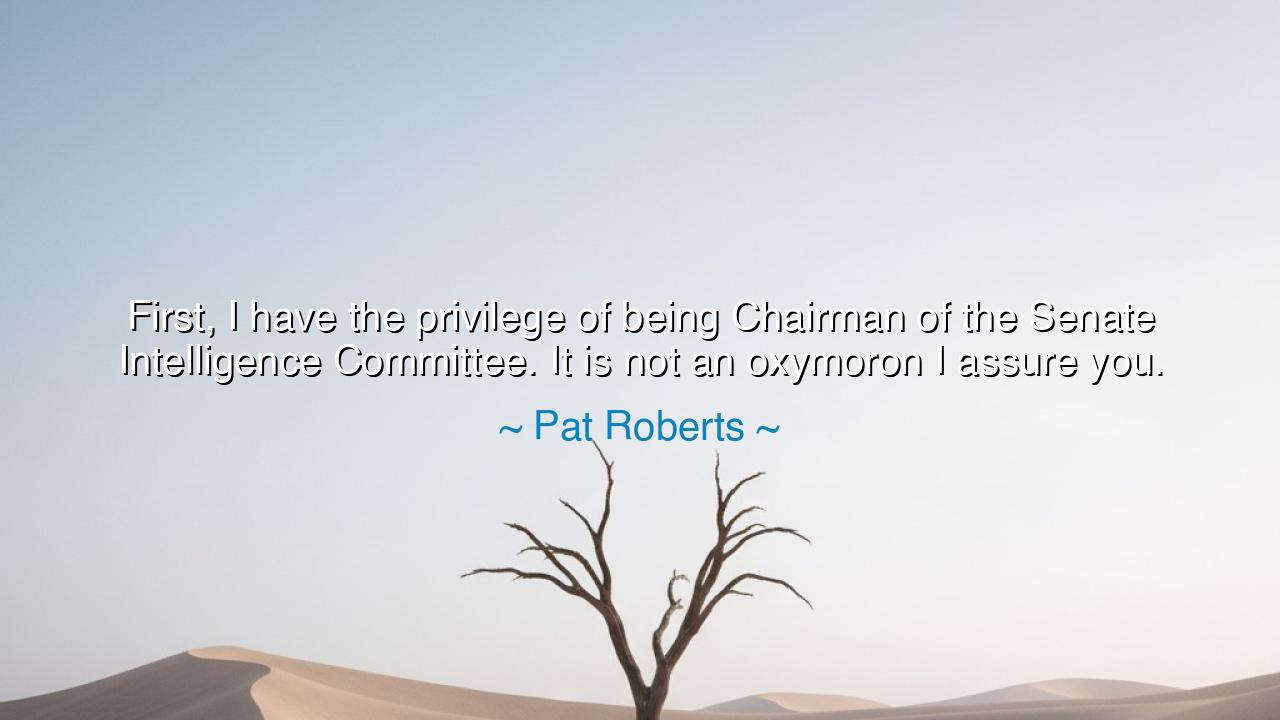
First, I have the privilege of being Chairman of the Senate
First, I have the privilege of being Chairman of the Senate Intelligence Committee. It is not an oxymoron I assure you.






In the insightful words of Pat Roberts, "First, I have the privilege of being Chairman of the Senate Intelligence Committee. It is not an oxymoron I assure you," we are confronted with a statement that, on the surface, may seem both playful and self-deprecating, yet carries a deep truth about the relationship between power, responsibility, and integrity. Roberts, as a leader in the world of politics and governance, acknowledges the inherent contradictions in the role he occupies. The term oxymoron, a paradox in itself, draws attention to the tension between intelligence and politics, two forces often perceived to be at odds with one another. Yet Roberts boldly asserts that his leadership in the Senate’s Intelligence Committee is no contradiction, but rather a call to responsibility and accountability.
The concept of intelligence—whether in the context of military, political, or personal wisdom—has always been a source of both admiration and suspicion in history. The ancients understood that knowledge is power, and with great power comes great responsibility. The Greek philosopher Plato explored this idea extensively, particularly in his dialogues, where rulers or philosopher-kings were often tasked with wielding wisdom for the greater good. However, Plato also warned that those in power must exercise integrity and never allow their influence to become a tool for selfish gain. Roberts' statement hints at this age-old tension: the need for intelligence to be wielded with honor and clarity, not muddled by the ambiguities or contradictions of political agendas.
Consider the example of Cicero, the Roman statesman and philosopher who, like Roberts, was tasked with navigating the often murky waters of political power and intelligence. Cicero’s role as an orator and consul required him to gather and utilize intelligence to protect the Roman Republic. He famously used his rhetoric to expose corruption and defend the Senate, even when it meant going against powerful figures such as Cataline, whose conspiracy threatened the very foundations of Rome. Cicero’s ability to balance knowledge with political duty made him a towering figure in Roman history. Yet, his downfall came when his political actions became too entangled in the complexities of power and the imperial ambitions of others. This paradox of intelligence and politics—how knowledge can be manipulated for both good and ill—is a theme that resonates through the ages, reminding us that those who wield intelligence in governance must do so with utmost integrity.
Roberts' light-hearted remark about his position as Chairman of the Senate Intelligence Committee also speaks to the critical importance of transparency and truth in matters of state. The role of the Intelligence Committee is to oversee, investigate, and ensure that the nation’s intelligence agencies are operating within the bounds of law and morality. In this way, Roberts’ reference to an oxymoron hints at a paradoxical but necessary tension—how can the intelligence that serves to protect a nation also be held accountable to the people it serves? The answer lies in transparency and the diligence of leaders to maintain ethical conduct in the pursuit of national security.
Consider the historical example of George Washington, whose leadership during the American Revolution required not only military intelligence but political savvy. Washington’s ability to navigate between the necessary secrecy of military strategy and the public demands of a fledgling republic set the foundation for how intelligence would be treated in the United States. Washington himself knew that, while military secrets must be guarded, the governance of the country must always be rooted in accountability to the people. Washington's wisdom in balancing these interests was a hallmark of his leadership, and his ability to integrate intelligence with political clarity set the tone for future generations.
The deeper lesson in Roberts' remark is that intelligence, in all its forms, requires a careful balance between knowledge and ethics. In the realm of politics, this balance is often delicate, as power can easily corrupt, and intelligence can easily be misused. Roberts’ reference to the oxymoron reminds us that it is not enough to simply possess intelligence; one must also wield it with a sense of purpose, integrity, and a commitment to the greater good. True wisdom lies in knowing that intelligence is not the end but a means to achieve a higher vision, one that serves society, protects freedoms, and upholds justice.
As we reflect on this, we can draw practical lessons for our own lives. Whether in leadership, decision-making, or daily conduct, we must remember that knowledge is not just about what we know but about how we use it. We must always ask ourselves if our actions are aligned with our ethics and whether we are using our intelligence for the betterment of others. In our relationships, in our work, and in our contributions to society, we must hold ourselves accountable, ensuring that our use of knowledge does not lead to division, deceit, or power for its own sake. Like Cicero, Washington, and Roberts, we too must commit to serving with honor, ensuring that our actions are always in service to a higher good, beyond mere personal gain.






AAdministratorAdministrator
Welcome, honored guests. Please leave a comment, we will respond soon